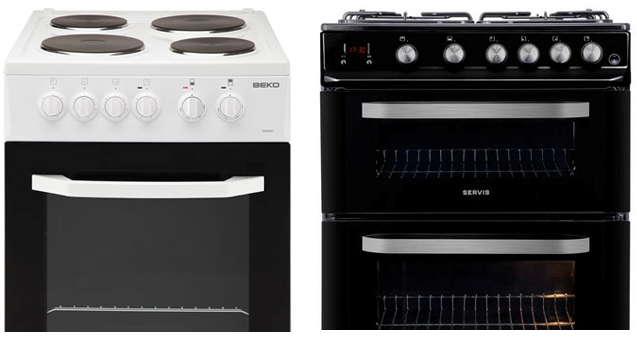As technology advances and global awareness of ecological impact grows, many Brits around the country are taking an increased interest in their household appliances and, more specifically, the environmental impact they have.
From energy-saving lightbulbs to energy-efficient washing machines, simple choices we make within the home can make a considerable difference to the environment when multiplied by an entire nation. What’s more, they can also have a positive impact on your bills too!
However, when it comes to appliances in the kitchen, there is arguably no feature more vital to culinary contentment than the oven. Whether you’re cooking a Sunday roast or a simple casserole, the humble oven is essential.
All of which begs the question: are ovens bad for the environment and, if so, are gas or electric ovens better for the environment? Let’s find out…

Gas vs. Electric
When it comes to oven cooking, marshals of mealtimes across the land have long wrestled with two primary choices: gas and electric.
Joined at the hip like other polarising household choices – from the bath/shower dilemma to the carpet/laminate quandary – the kitchen conundrum of gas or electric has split kitchen-dwellers worldwide for decades.
However, with the world becoming more and more aware of the environmental impact our living habits have on the world around us, eco-friendly options are becoming an increasingly important factor in the decision-making process.
So, which is better for the environment: gas or electric?
Skewed Statistics?
When considering the environmental impact of your kitchen appliances, it’s worth remembering that sensationalist reporting and clickbait headlines can be misleading. Scratch the surface of these articles and what lies beneath can be a different story entirely.
Case in point, these genuine headlines from January 2018:
The basis for these articles came from a study conducted by the University of Manchester, where it was claimed that “microwaves usage across the EU alone emits as much carbon dioxide as nearly seven million cars”.
Scary stuff, right? Well, maybe not, if you look beneath the selective stats.
Mythbusting
Such headlines have been debunked and dismissed by numerous experts since, with many specialists highlighting the misleading nature of these claims almost immediately after their publication.
One such expert – namely David Reay, Professor of Carbon Management at the University of Edinburgh – was quick to note the following:
“The statement ‘Microwaves could be as bad for the environment as cars suggests new research’ is completely incorrect in my view.
“Latest data show that passenger cars in the UK emitted 69 million tonnes of CO2 equivalent in 2015. This is ten times the amount this new microwave oven study estimates for annual emissions for all the microwave ovens in the whole of the EU.”
With such a polarising stance from a true expert of the game, it’s clear that the age-old adage of “don’t believe everything you read” is one that still rings true today, particularly in the age of fake news and bogus clickbait.
As such, be careful what you believe and be sure to gather your information from trusted resources backed by fact and not fiction before you buy into the lie.
Perks and Drawbacks
In terms of the environmental impact of gas ovens and electric ovens, both gas and electric have their perks and drawbacks.
While electricity may seem the obvious victor in eco-friendliness, electric cooking generally takes longer than gas meaning. As a result, cooking for additional time naturally uses additional energy in the process.
What’s more, while electricity may not directly burn fossil fuels to deliver heat, fossil fuels are often used in the generation of electricity, muddying the waters even further. As such, choosing between the two is a tough choice and neither one emerges as a clear-cut winner.
Instead, perhaps the best way to ensure your oven is keeping your kitchen as green as can be is to use it in an eco-friendly manner and ensure you are cooking in an energy-efficient fashion at all times.
Energy-Saving Oven Use
Luckily, there are a number of ways you can reduce your carbon footprint through the way you cook and none of them requires any skill or expertise to do so.
Repeatedly opening the oven door during cooking will allow heat to escape and lowering the oven temp which, in turn, prolongs cooking and uses more energy. Avoid this by keeping your oven glass clean and using that to gauge the cooking progress without opening the door.
Another seldom used tip is to turn off your oven a couple of minutes before your food is fully cooked. Provided the door remains cold, the oven will remain hot during those final minutes regardless of whether it’s on or not.
Even something as simple as turning off your electric oven at the plug can save energy, as they typically use energy even when left on standby.
Eco-Friendly Kitchen Appliances
If you are looking to replace your old oven with a new one, it’s naturally worth going for the one with the highest energy-efficiency rating. The highest grade of energy-efficiency for a kitchen appliance is A+++; however, anything over A+ is A-OK.
Meanwhile, when it comes to stove tops, induction electric hobs are typically considered to be the most favourable to environment, as they provide speedy heat source much like gas while also being more efficient than conventional electric, ceramic or halogen hobs.
For more information on eco-friendly kitchen appliances, why not drop us a line today? Call now on 02920 452 510 or get in touch online by clicking the button below.
Contact Us